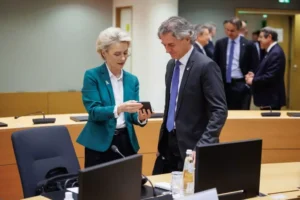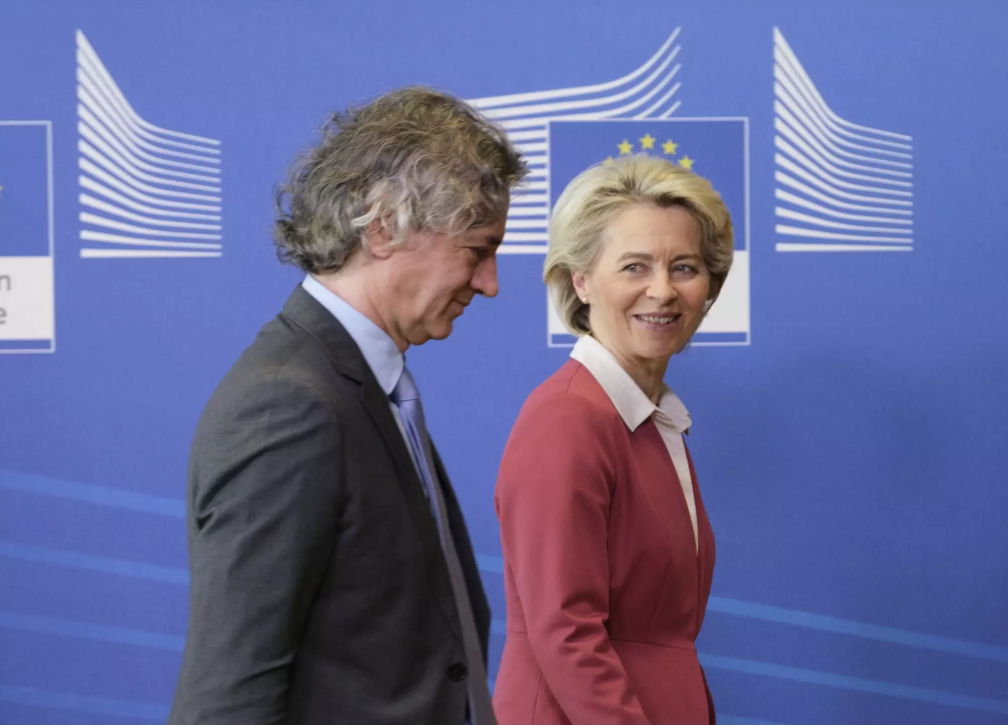MEP Milan Zver has succeeded – Ursula von der Leyen’s letter to Prime Minister Robert Golob, rejecting Tomaž Vesel as a candidate for the post of European Commissioner, has finally been revealed in its entirety. In it, we can read that von der Leyen had, in fact, dictated to Slovenia which candidate to put forward, humiliating both the country and Golob’s government. At the time, however, Golob claimed that the letter in question did not even exist. Which is just another lie by the Prime Minister.
Namely, the Prime Minister had already announced before the elections to the European Parliament that Tomaž Vesel would be Slovenia’s candidate for the post of European Commissioner. Comments that he might not be destined for the Commissioner’s post spread after Vesel’s conversation with the President of the European Commission, Ursula von der Leyen. Following her election as President, von der Leyen called on heads of European Union Member States to nominate candidates of both sexes for the European Commission. When this did not happen, the Commission President put pressure on the smaller EU Member States to change their choice. A letter was sent to Prime Minister Golob, the content of which was not known until recently, followed by Vesel’s resignation. The prevailing assessment was that Vesel had, in fact, been forced to resign and that the controversial Marta Kos had been chosen instead.
The letter was an enigma for a long time; the Prime Minister even claimed that the letter never existed, and the European Commission was also silent for a long time.
However, Member of the European Parliament Dr Milan Zver then made a request for the disclosure of European Commission documentation related to the process of appointing the Slovenian Commissioner. In particular, he requested the publication of a letter sent by the President of the European Commission to Prime Minister Golob, in accordance with Regulation (EC) No 1049/2001, which guarantees the public the right of access to internal documents of a public nature.
The letter was indeed made public in September in a censored version, and proved that the Prime Minister lied, who at the time sold the story to the public that Tomaž Vesel’s resignation had been a personal decision: “Look, Tomaž Vesel decided on his own to withdraw from the candidacy. He also explained his reasons. I think he is the only one who can explain them. He explained that his reasons are mainly a difference of concept as to how the European Commission should work.”
What does the fully disclosed correspondence between Golob and von der Leyen reveal?
As Milan Zver announced on social media, after seven months, the full official correspondence between Prime Minister Golob and President of the European Commission von der Leyen on the Slovenian Commissioner saga has finally been revealed. He himself had already requested it on the 11th of September 2024, when Golob was still lying that the letter, in which Ursula von der Leyen dismissed Vesel and humiliated Slovenia, did not exist.
“The documents also reveal how Golob sued the opposition and presented Kos as a “manager” and “communications expert with EU management experience”. You can decide for yourself how realistic this description is,” Zver wrote, sharing the full correspondence.
The first letter he published was sent by the President of the European Commission, Ursula von der Leyen, on the 24th of July 2024. In it, she wrote:
“Dear Prime Minister, Let me start by expressing my deepest gratitude for the renewed trust that the European Council has placed in my candidacy for a second term as President of the European Commission. I know this comes with great responsibilities and expectations, and I will do my absolute utmost to fully earn your continued confidence throughout the next five years.
Together, we have already achieved so much, very often against historically challenging circumstances. But a lot remains to be done for our Union and for our citizens. And we owe it to them to deliver more prosperity, more security and more democracy. I have set out my ambitions for the coming mandate in the Political Guidelines that I submitted to the European Parliament and to the Council.
In order to turn these ambitions into reality, I aim to build up a team of Commissioners that not only reflects and draws on our diversity, but also showcases our biggest collective strength: our unity.
As in the last mandate, I intend to present a gender-equal College of Commissioners. In this context and in accordance with your national rules, I would like to ask you to suggest two candidates, including a female candidate. This process does not apply if you intend to suggest the incumbent Member of the Commission. It follows from Article 17(3) of the Treaty on European Union that Commissioners are to be chosen on the ground of their general competence and European commitment from individuals whose independence is beyond doubt.”
To this, the Prime Minister responded:
“Dear President-elect,
On behalf of the Slovenian Government and in my own name, allow me to offer my sincere congratulations on your re-election as President of the European Commission.
In these challenging times, I find it of extreme importance to have a strong leadership in all EU institutions. I am looking forward to continuing our fruitful collaboration aimed at bringing forward the European project.
Looking ahead at the composition of the new European Commission and following your letter of 25 July 2024, I would like to inform you that the Slovenian Government nominated [redacted] as candidate for the member of the European Commission. [Redacted] has also been endorsed as candidate for EU Commissioner by the relevant committee of the National Assembly.
I am confident that [redacted] has the relevant knowledge, experience and leadership skills to contribute importantly to the success of the new European Commission.
Please accept, dear President-elect, the assurances of my highest consideration.”
Von der Leyen then responded on the 5th of September, writing:
“Dear Prime Minister,
On 19 August 2024, you have suggested [redacted] as Member of the Commission, pursuant to Article 17(7) of the Treaty on European Union.
In line with my duty pursuant to that same provision and Article 17(3) of the Treaty on European Union, I have interviewed the proposed candidate and assessed the general competence, European commitment and independence of [redacted]. In that assessment, I have in particular taken into account his prior professional experience, as set out in his CV.
As you know, Members of the Commission have to be able to engage with Members of the European Parliament and of the Council and to successfully defend the initiatives the Commission submits to them, as well as to conduct very important negotiations with third countries on behalf of the Union. Those competences are crucial for fulfilling the institutional role of the Commission pursuant to Article 17(1) and (2) of the Treaty on European Union. Those competences are acquired in particular in exercising high-profile political or at least ambassadorial responsibilities at the Union or at national level.
Having carefully assessed your suggestion, I regret to inform you that I am not in a position to propose [redacted] to the Council as part of the list of members of the Commission.
I therefore invite you to suggest without delay another candidate in order to proceed expeditiously. I would appreciate to receive your suggestion latest by Tuesday, 10 September 2024.”
And the Prime Minister wrote back:
“Dear President,
Further to your letter of 25 July 2024, I would like to inform you that on 6 September 2024, [redacted] withdrew his candidacy for the Member of the European Commission.
The Slovenian Government has today unanimously proposed to the National Assembly Ms Marta Kos as a new candidate for the Member of the European Commission. Ms Kos is a former Ambassador of the Republic of Slovenia to the Federal Republic of Germany and the Swiss Confederation, a manager, an expert in communication with many years of experience in leading positions and managing projects in the EU field, who meets all the criteria required by Article 17 of the Treaty on European Union.
According to our national legislation, Ms Marta Kos has to appear before the relevant committee of the National Assembly. The opinion of the committee is not binding. Regrettably, due to different views of the leading opposition party, the meeting of the relevant committee might not be convened before Wednesday as originally planned, which could lead to some delay in the official nomination of the Slovenian candidate.
I am confident that Ms Kos has the relevant knowledge, experience and leadership skills to contribute importantly to the success of the new European Commission and fully meets the criteria you recently highlighted. I would appreciate your feedback on the latter.”
The letter clearly reveals several details. Among other things, that von der Leyen perceives Golob as a vassal, to whom she can dictate who he can and cannot nominate as European Commissioner, referring to gender roles and Vesel’s competencies (although these were not an issue with Kos), but not if they decide to nominate the reliable supporter of Palestinian extremists, Janez Lenarčič again, who was European Commissioner until then.
The correspondence also reveals that Golob immediately submitted to her and cheerfully told her that Vesel himself has resigned (between the lines, of course, that he had actually been replaced) and that the new candidate is Marta Kos, extolling her abilities (however, two years before, Kos had resigned from Golob’s party, saying that the party did not share her values) – while also complaining that the council meeting that would have confirmed her is being restricted by the opposition, which has “different views”. Of course, the opposition’s opposing views were really just a request to clarify the matter. Ursula von der Leyen could not have known that Golob was lying in Slovenia – first, that the letter did not exist, then that they were never dictated who to appoint, and also that Vesel had “voluntarily” resigned because he and von der Leyen had disagreed on the concept of how to run the EU. In the end, however, all the lies came out.

This was not the first time that the EU has interfered in Slovenia’s internal affairs
The letter von der Leyen sent to Golob is far from the first example of the European Commission getting involved in Slovenia’s internal political, even judicial, processes. Namely, the EU Commissioner Věra Jourová visited the Slovenian Constitutional Court – at the time when it was reviewing the highly controversial amendment to the Radio-Television Slovenia Act, which allowed the complete usurpation of a public institution by the political left. In this case, MEP Milan Zver also demands full disclosure of the documentation related to her visit. Key parts of the documentation are still censored.

“The European Commission is increasingly distant from the people, non-transparent and closed. The case of Věra Jourová’s mission to Slovenia is just one small part of the mosaic that will be laid bare at the Court of Justice of the European Union. Thousands of cases are unfortunately being swept under the rug due to complex and costly procedures,” he wrote at the time.
Further complicating matters are the constant inconsistencies in the statements of the Slovenian Prime Minister, who is making European affairs into the kind of chaos we are used to in local politics. Just like he lied in the case of von der Leyen’s letter, he also claimed that, at the time when the Constitutional Court was reviewing the critical Radio-Television Slovenia Act, it did not matter that he himself had met with Matej Accetto, the then-President of the Constitutional Court.
I. K.


